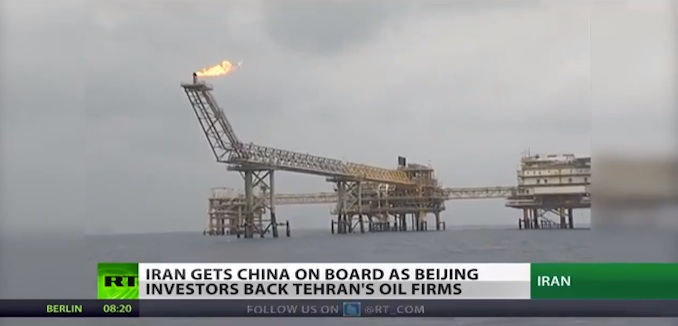A new oil contract being negotiated between China and Iran, which would see the Chinese state-trader Zhuhai Zhenrong Corp purchase light crude from Tehran, could according to Reuters boost imports from the Islamic republic “to levels not seen since tough Western sanctions were imposed in 2012,” in the process undermining Western efforts to limit financial relief provided to Iran under the Joint Plan of Action (JPA) announced weeks ago in Geneva.
That agreement was seen as a reward for a softer diplomatic tone from Tehran that was forced, some U.S. officials and lawmakers say, by U.S. and EU sanctions that slashed Iran’s oil exports by more than half to about 1 million barrels per day (bpd) and cost it as much as $80 billion in lost revenue. But industry sources say Chinese state-trader Zhuhai Zhenrong Corp, which was sanctioned by Washington in early 2012 for supplying gasoline to Iran, is in talks with the National Iranian Oil Company (NIOC) for a new contract for condensate. However, it was not clear how much of the light crude would be imported through any new term deal. Zhenrong or others could also continue buying condensate through spot deals.
Critics of the JPA had almost immediately raised concerns that even a limited erosion in the international sanctions regime would trigger a feeding frenzy, as nations and companies scrambled to ensure that they were not left behind in reentering Iran’s markets. Those concerns were derided as “fanciful” by analysts linked to the Obama administration, while administration officials themselves blasted skeptics as uninformed. White House assurances have since come under significant strain. Most straightforwardly, the administration’s assessment that the JPA would provide Iran with only $7 billion in relief appears to have neglected fundamental economic considerations including multiplier effects and the benefits of currency stabilization. Fears that a feeding frenzy will erode the sanctions regime even beyond what U.S. negotiators originally envisioned, meanwhile, have also gained traction. Actors ranging from automobile investors to Dubai have rushed to reestablish themselves inside Iran. News of the Chinese oil contract – which Reuters assesses would “go against” the JPA’s emphasis on limiting Iranian oil imports to “current average amounts” – are likely to deepen fears that a downward spiral is taking hold.
[Photo: Finance World News / YouTube]




